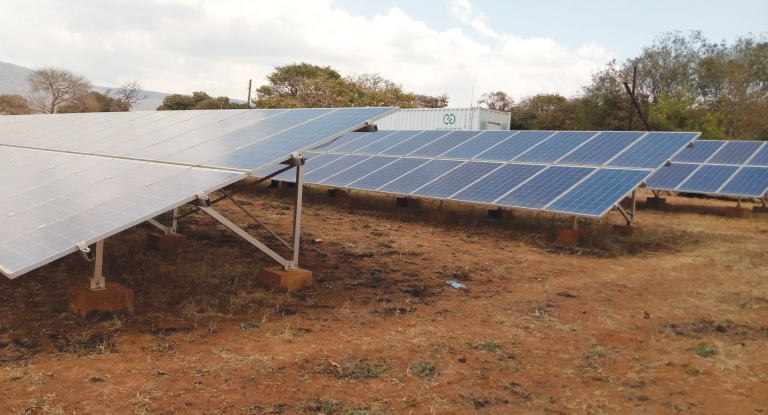Malawi continues to struggle with persistent power outages while sitting on great potential to be an energy self-sufficient country.
Apart from being blessed with waterfalls, the country experiences intense sunlight and high wind speeds in some districts that can be harnessed to generate electricity.
Solar garden in Sitolo Village in Mchinji
Sadly, despite such natural endowments, the country produces electricity that can hardly meet its energy needs due to underutilisation of reliable green sources of energy.
Their uses are in most cases limited to individual users or small communities like the solar power plant powering Likoma and Chizumulu islands. In Mchinji, 80kilowatts (kW) solar energy is produced while in Salima JCM produces 60 megawatts (MW).
One solar energy user in Lilongwe’s Area 23, Thomas Zgambo, testifies its goodness. He says it is reliable and produces electricity as the sun shines every day.
Says Zgambo: “Solar energy is the best source of electricity. Issues of blackouts are not a problem anymore. We always have electricity to use for lighting or running fridges.”
Annie Nyendwa of Sitolo Village, Traditional Authority Mlonyeni in Mchinji is one of 674 households benefiting from 80kW Sitola Solar Mini Grid.
“My life has been greatly transformed by this solar grid. I run fizzies making business and maize mill with the electricity. My business has grown in the two years that the grid has been operating,” says the mother of four.
Zgambo, however, laments the lack of expertise and durable solar equipment as a major setback in using solar power.
He says: “One needs to be a qualified technician to install solar electricity and good quality equipment to enjoy solar energy. At one time, my solar equipment exploded due to poor installation.”
Environmental activist Mathews Malata notes that Malawi has favourable climatic conditions to harvest solar energy.
He says the country should invest in solar plants in the Lower Shire and lakeshore districts.
Malata says there is need for government to create mechanisms that could lower the initial cost of investment in solar energy by removing taxes on solar equipment.
“We have been pushing for government to remove some of the taxes. They did at some point, but it did not translate into taking down the prices. We are still urging the Ministry of Finance to come up with mechanisms that will see more people being able to buy solar panels. They should consider removing import duty and excise duty and not just value added tax [VAT],” he says.
Ministry of Energy spokesperson Upile Kamoto says the ministry has put in place a strategy to promote usage of renewable energy.
She says they conducted feasibility studies on potential power generation sites for wind, geothermal and water most of which are available even for the private sector to invest as independent power producers or in partnership with government.
“Government has waived duty on importation of renewable generation systems to reduce capital cost for installation of renewable energy systems,” she says.
Kamoto adds that the government has opened up electricity generation for the private sector. n
The post Solar: Solution to power blackouts? appeared first on The Nation Online.
 Moni Malawi
Moni Malawi 
